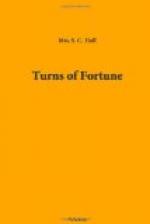“It is very true—very shocking indeed,” observed Dr. Adams. “I certainly will do something to secure my wife and children from the possibility of any thing like that, although, whatever were to happen to me, I am sure Lucy’s family would prevent”—
Charles broke in upon the sentence his brother found it difficult to complete—“And can you expect distant or even near relatives to perform what you, whose duty it is, neglect? Or would you leave those dear ones to the bitterness of dependence, when, by the sacrifice or curtailment of those luxurious habits which, if not closely watched, increase in number, and at last become necessaries, you could leave them in comfort and independence! We all hope for the leisure of a death-bed—awful enough, come as it may—awful, even when beyond its gloom we see the risen Sun of Righteousness in all his glory—awful, though our faith be strong in Him who is our strength; but if the consciousness of having neglected those duties which we were sent on earth to perform be with us then, dark, indeed, will be the Valley of the Shadow of Death. I do not want, however, to read a homily, my dear brother, but to impress a truth; and I do hope that you will prevent the possibility of these dear children feeling what they must feel, enduring what they must endure, if you passed into another world without performing your duty towards them, and through them to society, in this.”
Mrs. Adams met her brother-in-law that day (people five-and-twenty years ago did dine by day) at dinner, with an air of offence. She was, of course, lady-like and quiet, but it was evident she was displeased. Every thing at table was perfect according to its kind. There was no guest present who was not superior in wealth and position to the doctor himself, and each was quite aware of the fact. Those who climb boldly sometimes take a false step, but at all times make dangerous ones. When Charles looked round upon the splendid plate and stylish servants—when the children were ushered in after dinner, and every tongue was loud in praises of their beauty—an involuntary shudder passed through his heart, and he almost accused himself of selfishness, when he was comforted by the remembrance of the provision made for his own little ones, who were as pretty, as well educated, and as happy in their cheerful country home.
CHAPTER III.
The next morning he was on his return to Repton, happy in the assurance his brother had given him before they parted, that he would really lay by a large sum for the regular insurance of his life.
“My dear John,” said the doctor’s wife, “when does the new carriage come home? I thought we were to have had it this week. The old chariot looked so dull to-day, just as you were going out, when Dr. Fitzlane’s new chocolate-colour passed; certainly that chocolate-coloured carriage picked out with blue and those blue liveries are very, very pretty.”




